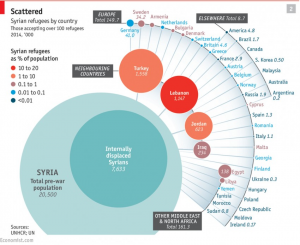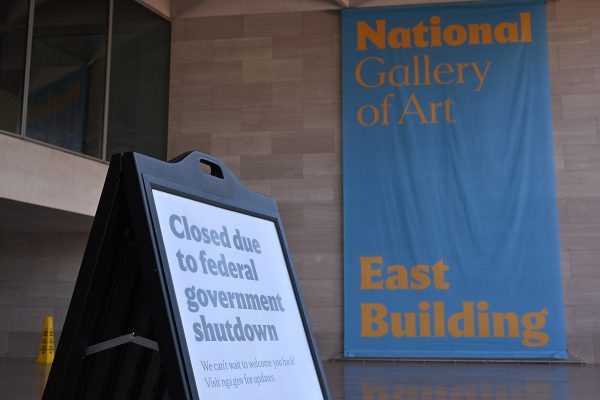The delicate balance of the Syrian refugee crisis
Google image/Creative Commons license
Syrian refugees enter a camp just over the Turkish border.
Some 4.1 million refugees had fled Syria in search of safety in neighboring countries and in the European Union (EU) as of September, according to the Migration Policy Institute (MPI). Countless more have sought asylum in the months since.
But after the terrorist attacks in Paris and San Bernardino, Calif., 25 Republican U.S. governors (and at least 28 overall to date) have stated that they will refuse to settle any Syrian refugees in their states. This kind of backlash could be dangerous for the futures of not only the refugees, but of the European and Middle Eastern countries struggling to support this massive influx of people.
As a world leader and as a nation among the best equipped to handle the resettlement of refugees, the United States arguably has a responsibility to help with this global crisis. However, the country has accepted just under 2,000 refugees since 2011, while the European nations have collectively accepted more than a quarter million—even as they pledge to accept many more in the coming years.
Furthermore, Syria’s neighbors—Turkey, Lebanon, Jordan, and Iraq—are struggling under the weight of approximately 3.9 million refugees. These are nations that are already facing internal problems and are not prepared to provide safe homes for the millions of people flooding across their borders. In some cases, the number of refugees per capita entering these nations is dramatic.
The United States is, by comparison, more politically stable, wealthier, has better infrastructure, and, by extension, much more capable of taking in those fleeing from Syria. President Obama has promised to resettle 10,000 refugees in the next fiscal year, but this announcement was met with outrage from Republicans already railing against illegal immigration and border security.
With the upcoming presidential election and the backlash from state administrators, it will be difficult, to say the least, to unite U.S. leadership on a particular solution. But if something is not done soon to help the refugees, it could have dire consequences.

Breaking down the Syrian refugee crisis.
Dr. Anders Lewis, chair of AMSA’s history department, said that the GOP’s reaction was “wrong” and “will backfire.” When asked about comments made by Sen. Ted Cruz and former Gov. Jeb Bush concerning the acceptance of only Christian refugees, Dr. Lewis seemed exasperated.
“I don’t know where to start,” he said with a humorless laugh.
He went on to clarify that both political parties—Republican and Democrat—are responsible for the refugee crisis in America. Atop the “blame list” is leading Republican presidential candidate and real estate mogul Donald Trump, but Dr. Lewis said that both parties have “painted an incredibly broad brush over the people of Syria.”
Dr. Lewis traced the problem to its roots, explaining that the displacement is being caused by the Islamic State in the Middle East, which is forcing Syrians from their homes. He asserted a belief that the Obama administration has done “astoundingly little” to stop the growth of ISIS in the region.
Dr. Lewis brought up previous American involvement in international conflicts, mentioning Vietnam, Korea, and Panama as examples, and pointing out that in all those instances, the United States was willing to send in ground troops to neutralize threats. However, in the Middle East, “all we do is drop bombs.”
Peter Proulx, a world and European history teacher at AMSA, offered a more moderate view, emphasizing the importance of seeing the big picture and not categorizing a group based on the actions of a few.
“[Americans] like to simplify things,” he said. He pointed to President François Hollande of France as a positive example. After the attacks in Paris, President Hollande announced that France would be accepting even more refugees than before.
“Compassion will beat out fear,” Mr. Proulx said.
At the same time, he expressed concern for the attitude towards Muslims in the United States, notably the comments pushing for the acceptance of solely Christian refugees.
“It’s troubling that you can characterize someone based on religion,” Mr. Proulx said. He explained that it seems that Christianity has become associated with love and Islam with evil in the United States. “It’s a conversation that people are scared of having.”
Both Mr. Proulx and Dr. Lewis touched upon the fact that although religious freedom is in the U.S. Constitution, there is still so much hate and discrimination in the nation. Mr. Proulx mentioned that this kind of intolerance and hate has happened before and has had drastic consequences. Dr. Lewis pointed to several laws passed throughout U.S. history that restricted immigration on the basis of fear and discrimination.
“It’s deeply troubling what is happening, to see how the world is responding to a world crisis,” Dr. Lewis said. “People are turning their backs on people in need. [We] hear over and over ‘never again’ and [then hear it] again.”

Cassandra is a senior with a penchant for ripping apart her peers’ papers. That is, she enjoys editing, which includes grammatical and technical corrections...






